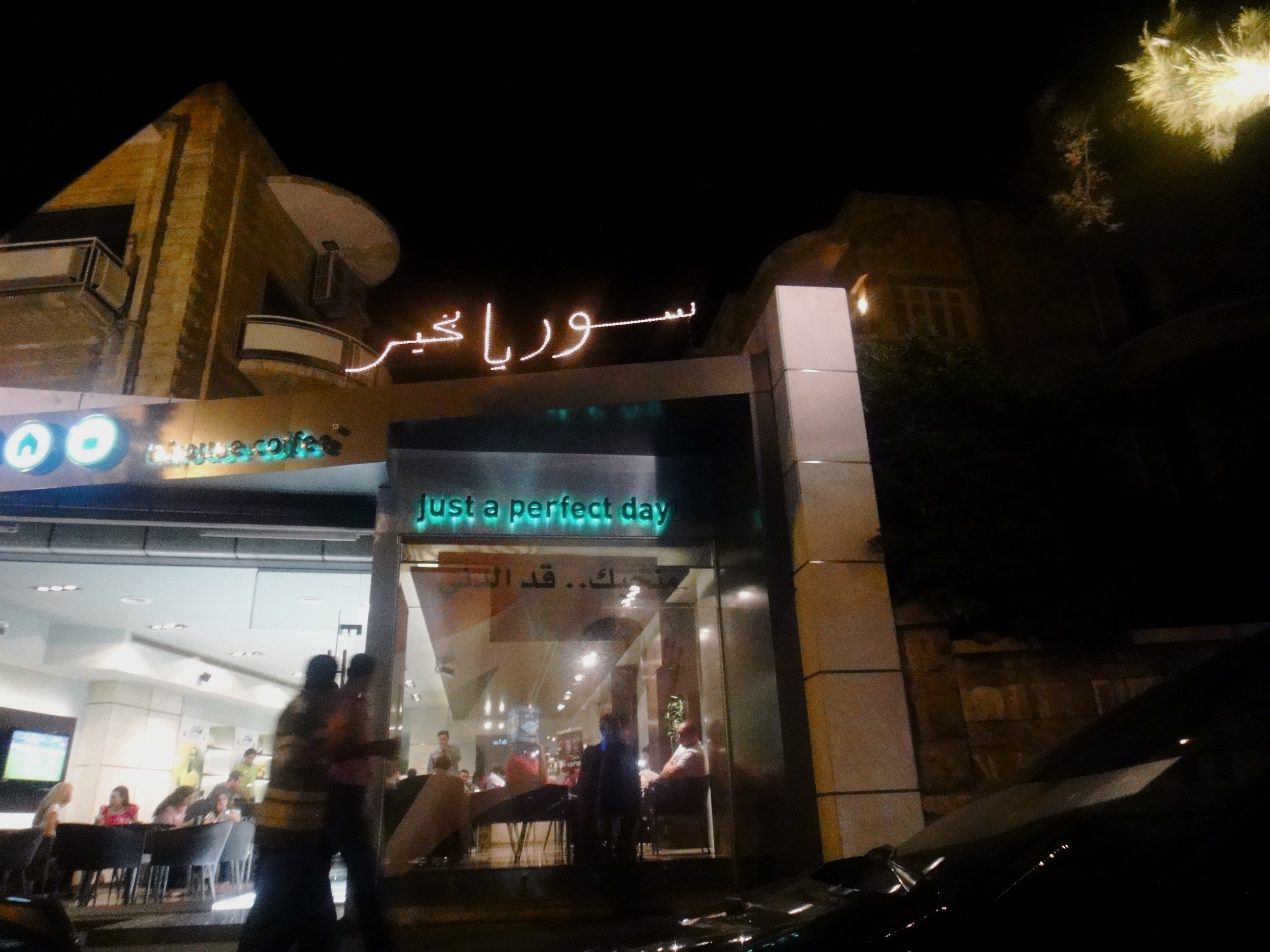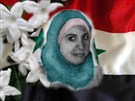[This is the seventh part of Amal Hanano`s diary of her trip back to Aleppo. You can read the previous parts here]
Like most acquaintances in our wired world, a certain “friend of a friend” had become a “friend.” I had admired her for months from afar, inspired by her bold status updates which openly criticized the regime. She was everything I wanted to be: defiant, outspoken, fearless. I had never met her, but after the Nadi Halab dinner, I felt tainted by association and needed redemption. So I did what one does in these situations: I initiated a Facebook chat. After weighing the risks, I quickly decided meeting in public would be safer than at home. So we set a date for coffee the next day.
At the popular café, I recognized her from her profile picture: pale complexion, black hair, bright smile. We sat, squeezed between the crowded tables. I scanned the space trying (and failing) to separate the mukhabarat from the regulars. There was no hope for privacy, and my plan to meet “openly” as if we had nothing to hide, which had seemed brilliant from behind my laptop, was obviously naïve. She politely initiated the mandatory small talk, but with the first, “So, how is everything?” the conversation took its natural, political course.

[Café in Aleppo. Lights announcing "Syria is well." Image from Amal Hanano]
In her view, most people in Aleppo opposed the regime but they lived in fear. I was skeptical and unconvinced about this “silent majority” that I kept hearing about after witnessing both the elite and the masses voluntarily singing Bashar’s praises. I told her I didn’t need to hear the “ma fi shi” stories; I had heard enough. She realized how jaded I had become during my visit and started again.
Though her cheerful optimism enveloped our table, it could not mask the horror of the stories she would tell me. She began with a dark personal account, when a few years ago, she and her family were threatened and blackmailed by a security officer who was interested in “a relationship” with her. The strong and well-connected men in her family were able to get her out of the situation unscathed, and untouched. But she asked me: “These are the people who are paid to protect us? Nothing happened to me, I only lived in terror for a couple of weeks, but what about the girls whose families don’t have money, don’t have connections, what happens to them?” There was no need to answer, we both knew very well what happens to them.
She had contacts in the army who had secretly pledged not to shoot innocent civilians but were terrified of defying orders. They were ashamed of the “military black market” filled with objects stolen from the homes of the vanished, snatched off of the bodies of the dead; where an iPhone can be purchased for $40, at a fraction of the current market price. She was disappointed with the opposition leaders and their cooperation with the government in the national dialogue, “There is no need for hiwar and their endless bullet points of demands. I can summarize all our demands in one simple point: isqat al-nizam, toppling the regime.”
She is well aware of the dangerous risks of her open dissent and ties to activists. She never sleeps before eight o’clock in the morning because the secret police snatch people from their homes between six and eight every morning, “After eight, I know that I am safe for one more day.” I asked her, “Aren’t you afraid?” She replied, “No, I don’t think about fear. It doesn’t worry me. I told my parents, if I get caught, don’t try to get me out, don’t humiliate me with a bribe to some Ba’athist officer. Let me live in prison, in dignity. I would rather die in dignity than live in this.” She waves her hand around, at the younger generation sitting idly, smoking, gossiping, texting. As she spoke, her round, innocent face became chiseled, and her black eyes hardened into steel.
She reminded me of activist Suhair Atassi from Homs, one of the sparks of the revolution who was arrested on March 15th, at the first protest in Damascus that demanded the release of political prisoners. She told the police who took her that in Syria, being inside or outside prison is exactly the same thing. She declared that the prison cells cannot hold every Syrian. (A close friend from Hama told me, “But she doesn’t understand that the earth can easily fit all Syrians. This regime is willing to bury everyone to stay in power.”)
At the end of our talk, my friend spoke sadly of the corruption that had trickled down to the lowest levels of society; even children’s art competitions were rigged in Damascus, where judges pass over gifted, but unconnected children to award prizes to the mediocre offspring of the powerful. Syria, in her eyes, had become a “graveyard of talent.”
We said goodbye in front of the café’s large glass window, covered with the image of Bashar under a charming colloquial caption, minhibbak qad al-dini “we love you as much as the world” and a recently installed string of lights announcing, Suriyya bi-kheir, “Syria is well.” (Is there a need to openly declare that a country is well unless it is not?) I hugged her tightly, emotionally connected to this girl who had become in two hours, much more than a “friend.” Holding back my tears, I asked her what she wanted from us, the Syrians living abroad. She replied “Public opinion. You can’t do anything from there but influence public opinion. Speak to the people we can’t reach, so they don’t forget about us. Don’t let our story die.” My banal parting words “take care” felt like blades in my throat.
She walked away, and her aura of courage that had shielded us, dissipated with her. I realized I was alone on the busy Muhafaza Boulevard, and I was afraid. My car was parked on a side street which had become dark in the last couple of hours. I walked slowly, clutching my car key in my hand. I wondered not if, but who had been watching us, listening to us. Every man was a threat; every car with tinted windows that passed could be shabbiha. A mustached man stood across the street from my car, looking straight at me. As I slid behind the wheel, I did something I have never done in Syria: I pressed the lock button immediately. I was both shaking and embarrassed to be shaking. This feeling of terror mixed with absurdity would repeat itself several times during my visit.
The next night I met a small group of friends at a popular restaurant in the predominantly Christian, al-Aziziyyeh area in downtown Aleppo. They spoke candidly about the recent atrocities and the atrocity of silence that has infected our community. They were distressed about the absent namoos, conscience, of the Aleppian people we had grown up with. They wondered, how many people needed to die before the loyalists change their minds? They asked, what we were supposed to do with the blood on our hands? They knew the government was plotting the ultimate mu’amara against their own people. Finally, this was the conversation I had expected to have since I arrived. I asked them if they understood how important they were, as influential people from an affluent society, insiders untainted by the west. They looked at me blankly, doubt and skepticism clouding their blue eyes, as if they didn’t understand what I was asking of them, or maybe they didn’t want to.
Even these young, educated, wealthy, privileged Sunnis, were cursed with limited perspective; the graveyard had not spared them. In America, we live by “impossible is nothing,” in Syria, “everything is impossible” is the standard. The regime “cuts our wings” and dictates the limits of our dreams. By fear, oppression, ignorance, corruption, the “system” has become the only possibility, the only way to exist. Syria, the graveyard of ambition, of ideas, of innovation, of hope. Our country, a panopticon that infinitely watches, judges, punishes, and worst of all, limits. Suhair Atassi was right, inside was the same as outside, but only because we have become prisoners of our limited selves.
Out of the hundreds of videos and images I’ve seen since the beginning of the uprising, there is one picture that moved me more than any other. It is my phone’s wallpaper and my laptop’s screensaver. Two Syrian children in a protest, a white banner unrolled between them, with letters painted the color of blood, “If the price of liberty is a shroud, then I have it with me.” The banner is a long white cloth used in Islamic burial rituals to wrap the dead. Two innocent boys, carrying their shroud, were ready to die for freedom.
For decades, Arab children have been taught to recite with pride the famous, almost century-old verse of Tunisian poet Abu al-Qasim Al-Shabbi: “If, one day the people desire life, then destiny must respond.” The verse, overused in overly-poetic compositions against the evil of (nonexistent) European colonialism, has become especially significant since the Tunisian Revolution sparked the Arab Spring. The line is once again fresh, relevant, and directed at the enemies of our time: our dictators. But what do they really mean, those two ambiguous words, arada al-hayat “desire life”?
Al-Shabbi’s “people” live in a world outside blue-lined composition journals: Mohamed Bouazizi, the Tunisian vendor who sparked the Arab Spring when he immolated himself after suffering humiliation by municipal officials; Khaled Saeed, the Egyptian who was tortured to death and whose brutal story inspired the Facebook page that mobilized Tahrir Square; and recently Hadi al-Jundi, the 22-year-old Syrian from Homs, who led street protests refusing to cover his face to inspire men like him to join, he was shot in the head by a sniper on July 8th. These heroes, along with the millions on the streets, the thousands murdered, the tens of thousands who have disappeared, my courageous friends and the two boys I will never meet, have proven that in revolutions, it is not enough to desire life. With their bodies, their voices, their words, they transformed Al-Shabbi’s critical verb arada, “want,” with a shift of a hamzah into a noun, irada, “will.” The steel will to life against all oppression. Willing to die for the act of willing life.
The next morning, I woke up with an optimism I had not felt in months. I glanced at my phone and sent a prayer to the two beautiful boys and to my friend, hoping she was safe in her bed, drifting to sleep, limitless in her dreams.*
*I had willed optimism into this post, willed it to end with an image of hope, but sometimes good intentions are not enough. A few days ago, on an especially bloody Friday, my friend’s brother was arrested for his dissent. Her shield of courage was not invincible. And another young man in a cell, waits for destiny’s response.
![[Children carrying a banner \"If the price of freedom is the shroud, then it is with me.]](https://kms.jadaliyya.com/Images/357x383xo/syria-coffin.jpg)










